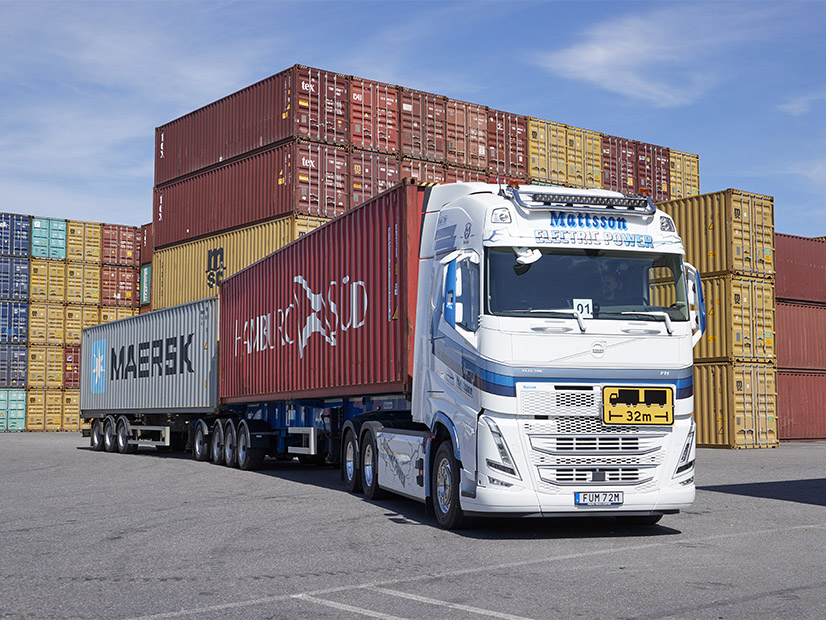
As a court battle heats up over California’s zero-emission truck regulations, a group of truck manufacturers on Thursday committed to follow the ZEV rules even if they’re overturned.
The commitment came through the Clean Truck Partnership, an agreement between leading truck manufacturers and the California Air Resources Board (CARB).
In exchange for their pledge to transition to zero-emission vehicles and meet tailpipe emission standards, CARB agreed to give manufacturers more compliance flexibility. The agency also promised to provide a minimum of four years’ lead time before imposing new requirements and at least three years of regulatory stability.
CARB Chair Liane Randolph called the agreement an “unprecedented collaboration.”
“This agreement makes it clear that we have shared goals to tackle pollution and climate change and to ensure the success of the truck owners and operators who provide critical services to California’s economy,” Randolph said in a statement.
The Clean Truck Partnership includes CARB and the Truck and Engine Manufacturers Association (EMA), along with the following manufacturers:
-
- Cummins Inc.
- Daimler Truck North America
- Ford Motor Co.
- General Motors Co.
- Hino Motors Limited Inc.
- Isuzu Technical Center of America Inc.
- Navistar Inc.
- Stellantis N.V.
- Volvo Group North America
ACT Targeted
The federal Clean Air Act allows California to request an EPA waiver to enforce its own emission standards for new motor vehicles. EPA granted a waiver for CARB’s Advanced Clean Trucks regulation in March. (See Groundbreaking California Clean Truck Rules Win EPA Waiver.)
The regulation, which CARB adopted in 2020, requires truck manufacturers to sell an increasing percentage of zero-emission medium- and heavy-duty trucks in the state from 2024 through 2035. In addition, CARB adopted in April the Advanced Clean Fleets regulation, which will ban the sale of diesel trucks in the state starting in 2036. (See CARB Adopts Clean Fleets Rule Despite Broad Skepticism.)
Other states may adopt California’s regulations rather than use federal standards. States that have adopted California’s ACT regulation include Colorado, Massachusetts, New Jersey, New York, Oregon, Vermont and Washington.
Under the Clean Truck Partnership agreement, truck manufacturers committed to selling as many zero-emission trucks as reasonably possible in every state that has adopted ACT. Those efforts will be “irrespective of the outcome of any litigation that has been filed or may be filed challenging the waivers or authorizations for those regulations or CARB’s or any state’s overall authority to implement those regulations.”
The EMA and the truck makers also agreed to be neutral when states are considering the adoption of ACT. But the parties can still comment on implementation issues, according to terms of the agreement.
On CARB’s end of the agreement, agency staff will propose giving manufacturers three years, rather than one year, to make up deficits in meeting ZEV requirements. CARB also committed to holding a workshop this year to discuss the concept of pooling ZEV credits and deficits across ACT states.
Also this year, CARB will hold a workshop “to discuss the appropriate role of hydrogen-fueled internal combustion engines” in meeting ZEV requirements.
In addition to ACT, the agreement addresses CARB’s so-called omnibus rules, which regulate truck tailpipe emissions. CARB has agreed to align its rules with EPA’s 2027 regulations for nitrogen oxide emissions and modify some parts of its 2024 NOx emission regulations.
“This alignment between California and the Environmental Protection Agency’s national standards for model year 2027 and beyond will help us get more clean trucks on the road across the country,” Cynthia Williams, global director of sustainability, homologation and compliance at Ford Motor Co., said in a statement.
Court Battle Waged
Last month, a coalition of 19 states, led by Iowa Attorney General Brenna Bird, petitioned a federal appellate court to review EPA’s approval of CARB’s Advanced Clean Trucks regulation.
Groups including the Western States Trucking Association and the Construction Industry Air Quality Coalition filed similar petitions.
Bird said in a release that ACT forces truckers to buy electric vehicles and “regulates trucking out of existence” through zero-emission standards.
Last week, California officials announced they were leading their own multi-state coalition seeking to intervene in the ACT lawsuits. Joining California in the motion to intervene were Colorado, Connecticut, Delaware, Hawaii, Illinois, Maine, Maryland, Massachusetts, Minnesota, New Jersey, New York, North Carolina, Oregon, Pennsylvania, Rhode Island, Vermont and Washington, the District of Columbia, and the cities of Los Angeles and New York.
The Environmental Defense Fund and three other environmental organizations also filed a motion to intervene last week.
